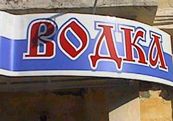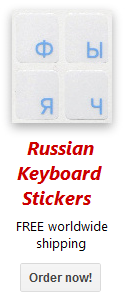 FR FR |
About us | Home | User agreement | Link to us |
The Accusative Case
The accusative case is an oblique case, which is used in the sentences like "Я ценю... Пушкина, дом, общество, страну" (I appreciate ... Pushkin, home, society, country). The nouns in the accusative answer such questions as Кого? Что? (Whom? What?).
| Не надо винить кого? | Не надо винить сына. | - | Whom one should not accuse? | One should not accuse a son. |
| Катя читает что? | Катя читает книгу. | - | What is Katya reading? | Katya is reading a book. |
Like the rest of cases (except prepositional) the accusative can be used with prepositions or without them. The typical prepositions for the accusative are: в, на, за, о/об, по, под, про, с, через. For example:
| упасть в воду | to fall into water | |
| знать про нас | to know about us | |
| встать на ноги | to stand on feet |
The principal meaning of the accusative is to designate a person or thing to whom or which and action is being done. For example: Люся любит брата (Lucy loves her brother); Мы видим море (We see the sea)
When used with the prepositions в and на, the accusative means motion towards or direction correspondigly.
To put nouns into accusative correctly you should know that Russian nouns are divided into animate and inanimate. Animate nouns are those which describe someone alive like человек, кошка (a man, a cat).
In general, the accusative is formed from the nominative singular nouns with the help of the following endings: -у, -ю, -а, -я (singular); -ей, -ой, -ов, -ев (plural). In most cases, you should remove the last letter from the nominative of the noun and add one of the mentioned endings (луна less -а plus -у = луну). The good news is that in some cases the accusative is similar to the nominative and genitive.
|
Remember, that the accusative is similar to the nominative!!
Also remember, that the accusative is similar to the genitive!!
|
The tables below sum up how the accusative of nouns is formed.
The Accusative of singular nouns
| Nominative singular |
Remove | Add | Accusative singular |
||
|
inan- Accusative |
masculine | стол чай ветер |
стол чай ветер |
||
| neuter | окно море |
окно море |
|||
| feminine | ночь | ночь | |||
| animate | feminine ending in -ь Accusative is equal to singular Nominative |
дочь | дочь | ||
| masculine | отец журавль |
-- ь |
а я |
отца журавля |
|
| feminine and masculine ending in -а, -я | бочка воля |
а я |
у ю |
бочку волю |
|
| inan- imate |
feminine ending in -а, -я | вода | а | у | воду |
The Accusative of plural nouns
| Nominative singular (plural) |
Remove | Add | Accusative plural |
||
|
inan- Accusative |
masculine | стол
(столы) чай (чаи) ветер (ветры) |
столы чаи ветры |
||
| neuter | окно
(окна) море (моря) |
окна моря |
|||
| feminine | ночь (ночи) | ночи | |||
| animate | feminine ending in -ь |
дочь | ь | ей | дочерей |
| masculine | отец журавль |
-- ь |
ов ей |
отцов журавлей |
|
| feminine
and masculine ending in -а, -я Accusative is equal to plural Genitive |
бочка
(бочки) стая (стаи) |
бочки стаи |
|||
| inan- imate |
feminine
ending in -а, -я Accusative is equal to plural Nominative |
вода
(воды) книга (книги) |
воды книги |
Got questions?
Ask them in the Russian Questions and Answers — a place for students, teachers and native Russian speakers to discuss Russian grammar, vocabulary, pronunciation, and other aspects of the Russian language.
Copyright 2001-2026 MasterRussian.com | Privacy Policy | Contact Us
 Russian Lessons
Russian Lessons
- Russian alphabet
- Names of letters
- Russian Q&A new
- Pronunciation: Cons.
- Pronunciation: Vowels
- Noun Gender/Number
- Cases of Nouns
- Russian Greetings
- Personal Pronouns
- Learning Russian
- 1000 Common Words
- 500 Russian Verbs
- Top Russian Nouns
- » All lessons
- » Guest lessons
 Browse Topics
Browse Topics
- Start learning Russian
- Forum
- Bookstore
- Dictionaries
- Russian - basic
- Russian - adv
- Pronunciation
- Russian Blog new
- Reading
- Test & quizzes
- Translation
- Verbs
- Verb Conjugations
- Russian numbers
- Russian Tests new
- Vocabulary
- Writing
- Folk music
- Fun stuff
- Leo Tolstoy
- Learner's lore
- Literature
- Personal blogs
- Picture Dictionary new
- Proverbs
- Publications
- Radio & TV
- Russian culture
- Schools in Russia
- Russian Words
- Russian names
- Software
- Russian Words iPhone
Clicks the "Like" button below to get daily updates on Facebook!
Click "Add to circles" to learn Russian on Google+

Search MasterRussian

English » Russian dictionary

WORD OF THE DAY
![]() RSS
|
iGoogle
|
My Yahoo!
RSS
|
iGoogle
|
My Yahoo!
Meaning: road, route, way
Pronunciation: [dah-ROH-gah]
Learn Russian words! »
TODAY'S STREET SIGN

Russian: Водка
English: Vodka
FOLLOW US ON TWITTER

MasterRussian on Twitter


